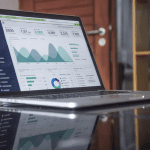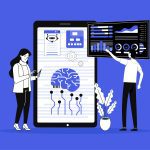Organizations often get data from varying sources. The data could be structured, semi-structured, or even unstructured data like audios or videos. Data is a key asset for any organization irrespective of its domain and size. A well-defined, reliable, scalable and business-driven data ecosystem plays a vital role in determining business outcomes. It is very important for a … [Read more...] about How Data Pipelines Work with Warehouses
Big Data
Learn everything you need to know about big data. Find out how companies are using this revolutionary technology and what it means for your business strategy.
How To Improve Your Hiring With Data-Driven Recruitment
Hiring managers leverage unbiased data analytics to make informed decisions from a pool of candidates. A robust tool for recruitment analytics transforms scattered data points into statistics useful for recruiters across hiring levels. HR analytics for recruitment is an excellent tool for streamlining resources and gaining valuable insights. You can also apply data analytics to … [Read more...] about How To Improve Your Hiring With Data-Driven Recruitment
How the Metaverse Will Change What It Means to be Human
The metaverse will enable you to be who you want, regardless of physical restraints or considerations. It will allow individuals to explore their identity in ways never possible before. The more we Step into the Metaverse, and the more the physical and the digital worlds converge, driven by continuous advancements in (digital) technologies, the more fun the world will become. … [Read more...] about How the Metaverse Will Change What It Means to be Human
What Should Be the Crypto Trading Strategy for Retail Investors?
Welcome to the world of crypto trading. Before we begin, let's have a quick look at what cryptocurrency is. Cryptocurrency is a digital asset that can get used as a medium of exchange using blockchain technology. Blockchain is a decentralized network of computers that keeps track of all transactions and can verify them without a central authority or third party providing … [Read more...] about What Should Be the Crypto Trading Strategy for Retail Investors?
Blockchain In Healthcare: 5 Major Benefits And Applications
Blockchain is one of the superior technologies that took the world by storm through its revolutionary work in data management and exchange traits. Its immense success across various industries has left many enterprises wondering if it's the right time to implement Blockchain in their business. If you are one of them, the answer is yes. Blockchain for business is a necessity in … [Read more...] about Blockchain In Healthcare: 5 Major Benefits And Applications
What is big data?
Big data is a term that refers to the massive amount of digital data created and shared every day. Big data can transform how we live, work, and communicate. It can be used to improve everything from public health and urban planning to business and marketing.
Big data is also changing the way we think about privacy and security. The volume, velocity, and variety of big data present challenges and opportunities for organizations and individuals. Regardless, big data is here to stay, and its impact will only continue to grow in the years to come.
What is big data analytics?
Big data analytics is the process of turning large, complex data sets into actionable insights. Businesses use various analytical tools and techniques, including machine learning and statistical analysis, to do this.
Big data analytics can be used to improve decision-making in areas like marketing, operations, and customer service. It can also be used to identify new business opportunities and optimize existing processes. With the help of big data analysis, businesses can gain a competitive edge by using their data better.
Want to learn more about big data? Datafloq has courses available. Contact us to get started.
When was big data introduced?
The term big data was coined in the 1990s, with some giving credit to John Mashey for popularizing the term. However, the concept of big data has been around for much longer.
Where does big data come from?
In the early days of computing, scientists and businesses began to realize that the amount of data being generated was increasing exponentially. As a result, they began to develop new methods for storing and processing data.
Over time, these methods have become increasingly sophisticated and have played a key role in enabling businesses to make sense of vast amounts of information. Today, big data is used in various industries, from retail to healthcare, and its importance is only likely to grow in the years to come.
What are examples of big data?
One of the most common examples of big data is social media data. With over 2 billion active users, Facebook generates a huge amount of data every day. This includes information on user interactions, posts, and even location data. Analyzing this data can help companies better understand their customers and target their marketing efforts.
Another example of big data is GPS signals. These signals are constantly being generated by devices like cell phones and fitness trackers. When combined with other data sets, GPS signals can be used to provide insights into everything from traffic patterns to human behavior. Finally, weather patterns are another type of big data set. By tracking these patterns over time, scientists can better understand the impact of climate change and develop strategies for mitigating its effects.
How do companies use big data?
Companies use big data in marketing, product development, and customer service. By analyzing large data sets, businesses can identify patterns and trends that would be otherwise difficult to spot. For example, a company might use big data to track customer behavior patterns to improve its marketing efforts.
Alternatively, a company might use big data to improve its products by identifying areas where customers are most likely to experience problems. For instance, big data can be used to improve customer service by finding pain points in the customer journey. Ultimately, big data provides companies with a valuable tool for gaining insights into their business operations.







